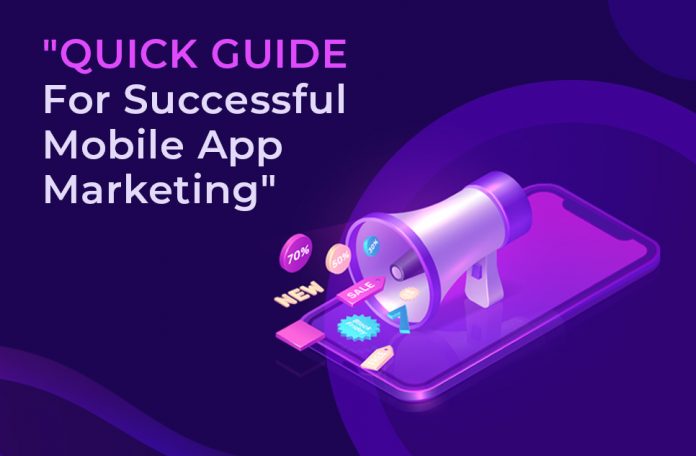The number of mobile applications available on the world’s leading App stores totals to more than four million to date. The multitude of options available to a user to choose from increases every day. Mobile App creators know that a diligent and targeted app marketing strategy is crucial to make a niche in the app market. If you cannot sell your product to potential users, all the efforts put into developing and building a spot-on app is practically worthless. No matter how flawless your creation is, users need to know your presence in the market.
Marketing a mobile app involves an intrinsic process divided into three major phases. It encompasses every interaction with the user, from the moment they first learn about your product to the point when they become loyal users. You need to bring to their attention that you have an App that perfectly fits the user’s demand and you need to start the process even before you start coding. This is the time you sell your vision and perspective that garners their interest and initiates speculations about what you have in store for them. Once you know their inquisitiveness has peaked enough, you make the grand entrance. Then comes the never-ending retention phase where you convert the new users into loyal.
Phase I: The Pre-launch
The pre-launch or awareness stage starts before the app is put out in the market. The strategy during this stage should be to highlight the features and specialties of your product. Choose the platforms that will help you reach your target users most effectively. The only prerequisite is that you understand your brand messaging and positioning. A definite brand position gives users a chance to connect with your product on an individual level.
1. Fix A Date!
Planning a tentative release date can stream-line the pre-launch campaign. This also ensures that your users do not feel lost or uninformed. Planning far in advance gives you a time bracket within which you set your pre-launch activities. Beware about the events in the market around the launch date that may influence the success of your App.
2. Know the market, Know your users!
Discover the key players in your app category and study their marketing strategies to build on the pros and learn from the cons. Study your top five competitors to understand the real-time situation in the market. To make your app a perfect match for your users, incorporate each one of their requirements and do it in a way that is easy to use. Identify and research the most influential blogs and sites which have an impact on their choice.
3. You need a Brand Identity
Create an identity that addresses your target user’s main problem, interests, and values. Each one of your target user groups may have unique requirements that you will have to consider. Here your research will help you design your ideal user and develop your app accordingly. The user identity includes their background, demographics, preferences and the challenges they currently face.
4. Don’t forget your Landing Page
Create a pre-launch landing page and use it as a menu-card, giving your users all the details that concern them. Mobile websites have proven to have the highest conversion rates. Prepare an interesting video that explains your app. Having a pre-launch website is the way to do SEO (Search Engine Optimization), which has now become a standard process. Once you have these orders in place, you can keep updating the content on the site/video and display it on social platforms or paid ads.
5. Promote on Social Media
Make your presence felt on social media across platforms like Facebook, Instagram, Twitter, and LinkedIn. Based on your targets groups, decide which platform will be beneficial. Use influencers and publications to send out messages regarding your milestones and reviews. You can avail the mobile app promotion services to enhance the volume of your reach.
Also read our Quick Guide For Successful Social Media Strategy
Phase II: The Launchpad
The launch is the most crucial phase of the journey where the user acquisition takes place. Be creative and utilize different methods. Make sure you realign your app marketing strategy to the market demand. The goal is to get as many downloads as possible during the first-week post-launch. Keep a track of where the downloads are originating from.
1. Paid Strategy never goes wrong!
Roll out advertisements and influencer reviews on social platforms for potential users to summarise the success of your app. Make sure you use the correct platforms for good confirmed returns on investment.
2. App Store Optimization (ASO)
App Store Optimization means optimizing your App Store presence to rank higher in search results. Above 65% of downloaded apps are discovered by users on the App Store search. Tag the correct keywords which will keep the app ranking higher for a few months. Increased visibility will ultimately lead to more downloads, which will help to gain the editors’ attention. An interesting and descriptive title will boost the user’s curiosity to click on your app and discover more. Be persistent in pitching to the App Store’s editorial team to get featured. This is another tool for marketers to utilize.
Phase III: The Retention mode
This phase is a continuous one. Once you have acquired users, you need to assure that they stay loyal to you. Come up with a plan of action for retention marketing to convert your users into lifelong users.
1. Feedback and Quick Response System
Keep a two-way conversation. Allow users to express their opinions. Make your brand approachable for the users to share their feedback to help understand their changing requirements. Keep an opening for complaints and set up a process for spontaneous response.
2. Push Notifications
In-app conversations are a way to initiate immediate CTA (Call-To-Action). Send push notifications about updates and new features, reminders, ask for reviews and warnings about app issues and payments.
3. Bonus and Benefits
Offer your users a bonus or additional benefits for promoting your app with a referral point system and coupons. Giving users the incentive to use your app features can assure loyalty.
You need to make a niche in the market for the user to choose you over the other apps available in the market. Getting a loyal user base is very crucial for an app to survive in a highly competitive market. The app marketing agency provides services across all three phases















